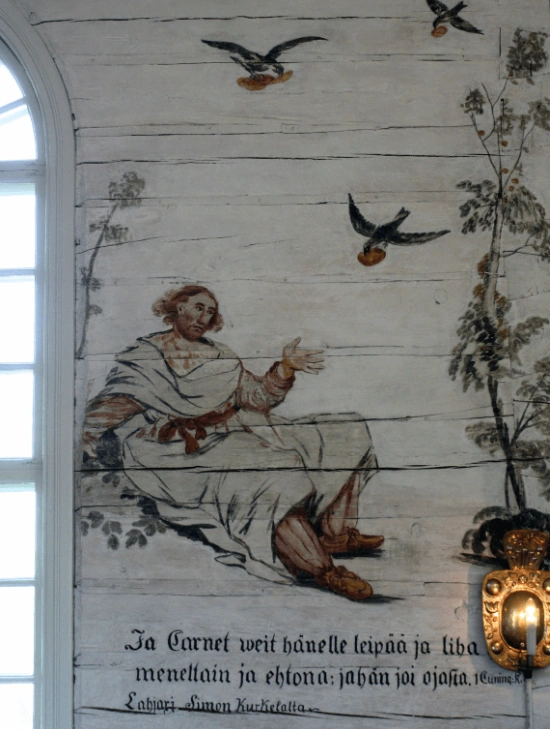9373. Come up unto Jehovah. That this signifies conjunction with the Lord, is evident from the signification of “coming up,” as being to be raised toward interior things (see n. 3084, 4539, 4969, 5406, 5817, 6007), consequently also to be conjoined (n. 8760). That it denotes conjunction with the Lord, is because by “Jehovah” in the Word is meant the the Lord, (n. 1343, 1736, 1793, 2004, 2005, 2018, 2025, 2921, 3023, 3035, 5663, 6280, 6303, 6905, 8274, 8864, 9315). A secret which also lies hidden in the internal sense of these words, is that the sons of Jacob, over whom Moses was the head, were not called and chosen; but they themselves insisted that Divine worship should be instituted among them (according to wh at has been said in n. 4290, 4293); and therefore it is here said, “and He said unto Moses, Come up unto Jehovah,” as if not Jehovah, but another, had said that he should come up. For the same reason in what follows it is said that “the people should not go up” (verse 2); and that “Jehovah sent not His hand unto the sons of Israel who were set apart” (verse 11); and that “the appearance of the glory of Jehovah was like devouring fire on the top of the mountain in the eyes of the sons of Israel” (verse 17); and lastly that Moses, being called the seventh day, “entered into the midst of the cloud.” For by “the cloud” is meant the Word in the letter (n. 5922, 6343, 6752, 6832, 8106, 8443, 8781); and with the sons of Jacob the Word was separated from its internal sense, because they were in external worship without internal, as can be clearly seen from the fact that now, as before, they said, “all the words which Jehovah hath spoken we will do” (verse 3); and yet scarcely forty days afterward they worshiped a golden calf instead of Jehovah; which shows that this was hidden in their hearts while they were saying with their lips that they would serve Jehovah alone. But nevertheless those who are meant by “the called and the chosen” are those who are in internal worship, and who from internal worship are in external; that is, those who are in love to and faith in the Lord, and from this in love toward the neighbor.
Elijah

Elijah (referred to as Elias in the New Testament) was the renowned prophet sent to the split kingdoms of Israel and Judah. His first appearance is in Chapter 17 of I Kings where he comes to speak to Ahab, king of Israel. He contends with Ahab, and Ahab’s wife Jezebel, and later Ahab’s son Ahaziah. These contentions have passed down to us in many well known stories.
In II Kings, Chapter 2, Elijah is carried up to heaven in a chariot of fire, and his mantle is given to Elisha, his disciple and successor. Elijah represents the Lord as He comes to us in the Word, that is, the way we think about the Lord when we read the Word (especially the prophetic parts of the Word). Elijah and John the Baptist are similar in their symbolic meaning.
(参照: Arcana Coelestia 5247 [6], 6752, 9372 [2])
Arcana Coelestia#5406
5406. 'Go down there, and buy for us from there' means making them its own through that knowledge. This is clear from the meaning of 'going down' as an expression used to describe movement towards things that are more external, dealt with below; and from the meaning of 'buying' as making one's own, dealt with in 4397, 5374. The accomplishment of this through that knowledge, factual knowledge, is meant by 'from there', that is to say, from Egypt; for 'Egypt' means factual knowledge, as shown above. Various places in the Word contain the expression to go up or to go down when a movement from one place to another is described. The reason for this usage is not that one place was higher than another but that going up describes a movement towards things that are more internal or superior, while going down describes a movement towards things that are more external or inferior. That is, 'going up' refers to movement towards things that are spiritual and heavenly since these are more internal and are believed to be superior, whereas 'going down' refers to a movement towards natural and earthly things as these are more external and also to outward appearance inferior. This explains why not only here but also everywhere else in the Word one is said to go down from the land of Canaan to Egypt and to come up from Egypt to the land of Canaan. 'The land of Canaan' means that which is heavenly, and 'Egypt' that which is natural; for in the representative sense the land of Canaan is the heavenly kingdom, and consequently celestial and spiritual forms of good and truth, which also reside more internally in a person who is the Lord's kingdom, whereas 'Egypt' in the representative sense is the natural kingdom, and consequently the forms of good and truth which belong to the external Church and exist for the most part as factual knowledge. For the use of 'going up' to describe a movement towards things that are more internal, see 4539.






